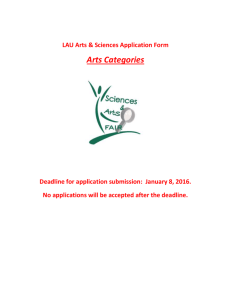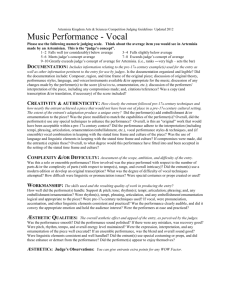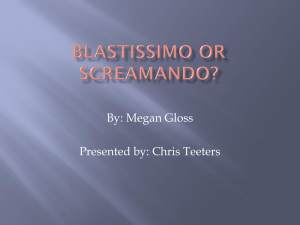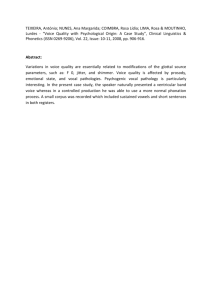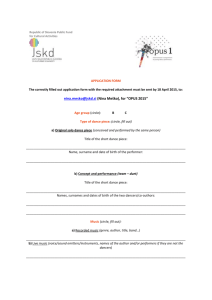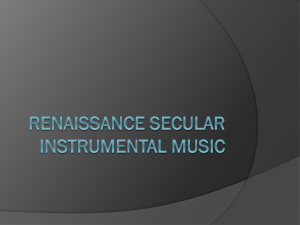Word Document
advertisement
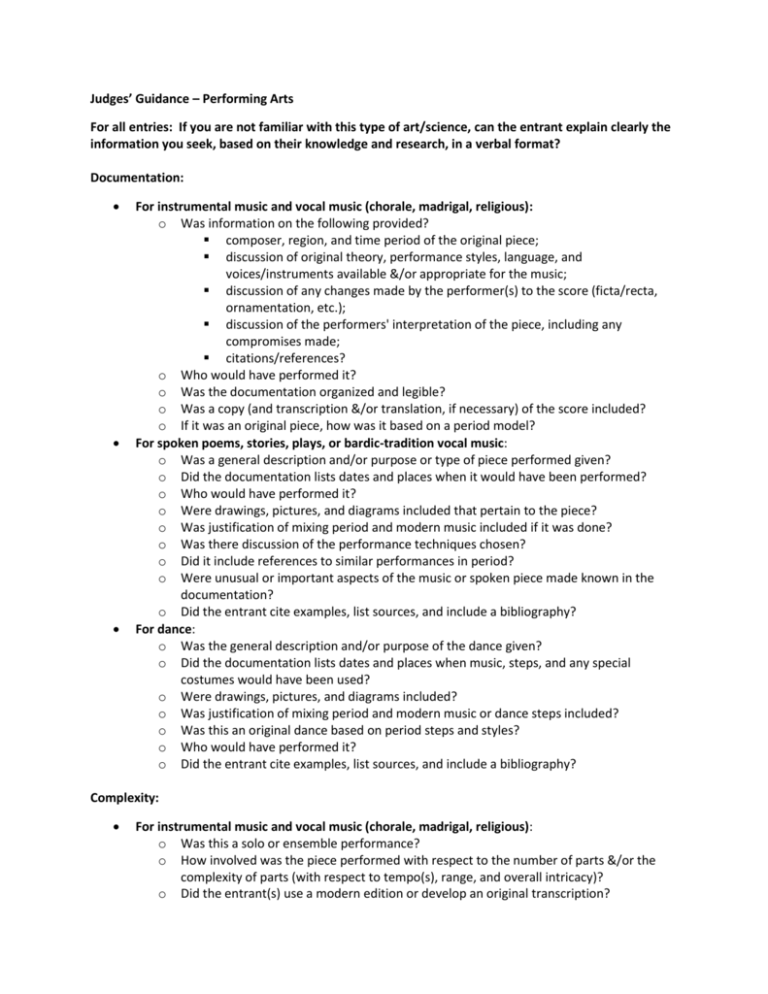
Judges’ Guidance – Performing Arts For all entries: If you are not familiar with this type of art/science, can the entrant explain clearly the information you seek, based on their knowledge and research, in a verbal format? Documentation: For instrumental music and vocal music (chorale, madrigal, religious): o Was information on the following provided? composer, region, and time period of the original piece; discussion of original theory, performance styles, language, and voices/instruments available &/or appropriate for the music; discussion of any changes made by the performer(s) to the score (ficta/recta, ornamentation, etc.); discussion of the performers' interpretation of the piece, including any compromises made; citations/references? o Who would have performed it? o Was the documentation organized and legible? o Was a copy (and transcription &/or translation, if necessary) of the score included? o If it was an original piece, how was it based on a period model? For spoken poems, stories, plays, or bardic-tradition vocal music: o Was a general description and/or purpose or type of piece performed given? o Did the documentation lists dates and places when it would have been performed? o Who would have performed it? o Were drawings, pictures, and diagrams included that pertain to the piece? o Was justification of mixing period and modern music included if it was done? o Was there discussion of the performance techniques chosen? o Did it include references to similar performances in period? o Were unusual or important aspects of the music or spoken piece made known in the documentation? o Did the entrant cite examples, list sources, and include a bibliography? For dance: o Was the general description and/or purpose of the dance given? o Did the documentation lists dates and places when music, steps, and any special costumes would have been used? o Were drawings, pictures, and diagrams included? o Was justification of mixing period and modern music or dance steps included? o Was this an original dance based on period steps and styles? o Who would have performed it? o Did the entrant cite examples, list sources, and include a bibliography? Complexity: For instrumental music and vocal music (chorale, madrigal, religious): o Was this a solo or ensemble performance? o How involved was the piece performed with respect to the number of parts &/or the complexity of parts (with respect to tempo(s), range, and overall intricacy)? o Did the entrant(s) use a modern edition or develop an original transcription? o What was the degree of difficulty of vocal &/or instrumental techniques attempted? o If vocal, how difficult were linguistic &/or pronunciation issues? o Were any special costumes or props created or used? For spoken poems, stories, plays or bardic-tradition vocal music: o What was the complexity and variety of piece performed? o Did the entrant develop it from a period source, use a modern translation, or is this an original composition? o Was there difficulty of execution of the techniques? o Was this a solo or ensemble performance? o Were any special costumes or props used? o What was the difficulty of performing techniques? o Was it a physically challenging or complex, intricate presentation? For dance: o What was the complexity and variety of steps, sequences, and music? o Did the entrant develop it from a period source, use a modern translation, or was this an original work? o Was there difficulty of execution of the techniques? o Were any props, special costumes, or live musicians used? o Was this a solo or ensemble performance? o Was the dance physically challenging, complex or did it require a particularly intricate presentation? Creativity: For instrumental music and vocal music (chorale, madrigal, religious): o Did the performer(s) add embellishment &/or ornamentation to the piece? o Was the piece modified to match the capabilities of the performer(s)? o Overall, did the performer(s) use any special techniques to enhance the performance? For spoken poems, stories, plays, or bardic-tradition vocal music: o Was the entry creative? o Did the entrant make an exact copy of a period piece? o Did the entrant base an original work in the style of a period piece? o How much did the entrant’s piece differ from the original? o If vocal music, did the performer add any appropriate vocal embellishments? For dance: o Did the entrant make an exact copy of a period piece? o Did the entrant base an original work on a period piece? o How much did the entrant’s piece differ from the original? Authenticity: For instrumental music and vocal music (chorale, madrigal, religious): o If instrumental or mixed ensemble, were pre-1600 or modern instruments used? o Did the performance adhere to the interpretation (including tempi, phrasing, articulation, ornamentation/embellishment, etc.), vocal &/or instrumental performance styles & techniques, and (if ensemble) vocal &/or instrumental combination in keeping with the stated time period and culture of the piece? o If vocal, was the use of language and linguistic elements in keeping with the stated time frame and culture? o If compromises were made, did the entrant(s) explain these? o Overall, to what degree would this performance have fitted into and been accepted in the setting of the stated time period and culture? For spoken poems, stories, plays or bardic-tradition vocal music: o To what degree had the entrant gone to use period techniques, structures and processes to create the entry? If modern substitutes or conventions were used, did the entrant explain why? o Did the spoken or sung piece give the appearance and impression of period work be it song, story, poem or play? For dance: o To what degree had the entrant gone to use period steps, music, and embellishments create the entry? If modern substitutes or conventions were used, did the entrant explain why? o Did the dance give the appearance and impression of period dance? o Did it seem appropriate to the type of dance stated in the documentation? Aesthetic qualities: For instrumental music and vocal music (chorale, madrigal, religious): o Was the performance smooth? o Did the performance sound polished? o If there were any mistakes, was recovery good? o Were pitch, rhythm, tempo, and overall energy level maintained? o Were the expression, interpretation, and any ornamentation of the piece well executed? o If an ensemble performance, was the blend and overall sound good? o If vocal, were linguistic elements consistent and well handled? o Did the entrant(s) use special costuming or props, and did these enhance or detract from the performance? o Did the performer(s) appear to enjoy themselves? For spoken poems, stories, plays or bardic-tradition vocal music: o Was the performance smooth? o Did the performance sound polished? o If there were any mistakes, was recovery good? o Did the entrant use special costuming or props and did they enhance or detract from the performance? o Were the vocal expression and interpretation and ornamentation of the piece appropriate? o Did the performer(s) enjoy themselves? o Were you moved, entertained, or informed by the selection? For dance: o Was the performance smooth? o Were the dance steps and music periods appropriately combined? o If there were any mistakes, was recovery good? o Did the entrant use special costuming or props and did they enhance or detract from the performance? o o Did the entrants enjoy the dance? Were the style and props/costumes authentic to the period of the dance? Workmanship: For instrumental music and vocal music (chorale, madrigal, religious): o How well did the performer(s) handle: support & pitch; tone; rhythm(s); tempi; articulation; phrasing; and, any embellishment or ornamentation? o Were rhythm(s), tempi, phrasing, articulation, and any embellishment/ornamentation logical and appropriate to the piece? o Were pre-1600 techniques used? o If vocal, were pronunciation, accentuation, and other linguistic elements consistent and practiced? o Was the performance clearly audible, and did it convey the appropriate emotion and hold the audience interest? o Were the performers at ease and practiced? For spoken poems, stories, plays or bardic-tradition vocal music: o Was the voice properly supported and in tune? o Were articulation and enunciation clear? o Were rhythm, tempi, phrasing, and articulation logical and appropriate to the piece? o Was the performance clearly audible and visible? o Did it convey the appropriate emotion and hold the audience interest? o Were period techniques used? o Was the piece memorized? o Were the performers at ease and practiced? For dance: o Were the techniques, steps, and gestures used appropriate to the period of the dance? o Were steps and motions sure, graceful, and in time with the music? o Were the figures danced well balanced and executed? o Was the dance directed at the audience and did it capture their attention? o Was the dance memorized? o Were upper body movements appropriate to this dance? o Were the dancers at ease and practiced?
